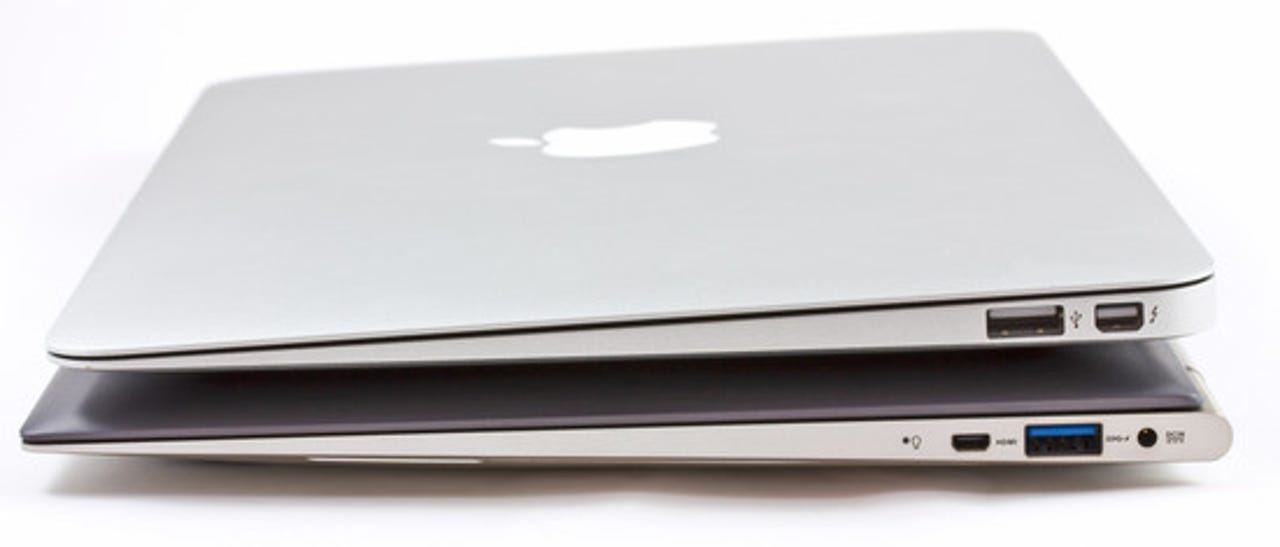Could AMD be part of Apple’s supply chain?

These days, confusion reigns about Intel’s intent for Ultrabooks.
Last month Intel gave Digitimes the slapdown to publicly reaffirm that a rose is not a rose, and a normal marketing incentive should never be confused with an implicit subsidy. On December 8 I speculated that Intel may be carefully avoiding antitrust concerns because the FTC's Consent Decree prohibits Intel from punishing or threatening manufacturers for using its competitors processors.
Has Apple been doing something behind the scenes that might warrant a backlash from Intel?
Given that Apple was testing AMD processors just before Intel announced its well-funded Ultrabook Fund to subsidize an international army of MacBook Air clones, media or regulators could interpret or misinterpret Intel’s intent for the Ultrabook Fund and attack of the clones as a predatory attack on Apple for testing or perhaps even planning to use processors from an Intel competitor. Thus, it would be prudent for Intel to avoid the appearance of intent.
Intel has made it very clear that appearance isn’t everything. Supposedly, Intel isn’t intentionally placing Apple in its Ultrabook Fund crosshairs. The appearance of mobilizing and subsidizing an army of MacBook Air clones to smack Apple by accident versus smacking Apple with intent would certainly make a big difference to antitrust regulators.
In fact, just this week, Intel reaffirmed in a recent interview that the appearance of competition is not actual competition. Intel’s roadmap now includes a new focus on hardware, form factor and even software - which closely mirrors Apple’s products and business model. Despite the appearance that Intel’s is essentially designing laptops that look like MacBook Air clones and developing Apple-esque plans to get into the software business, Intel is not competing with Apple?
Even Intel’s Ultrabook manufacturers, who are closely collaborating with Intel on co-advertising among other things, seem to be accidentally targeting Apple. In fact, Ultrabook manufacturers (like ASUS) seem so confused by their blurry crosshairs that they can’t even make out whether a MacBook Air is really a picture of a MacBook Air!
In the screenshot (above) from October 2011, ASUS identified the competitor to its Zenbook Ultrabook as a "Fruit Brand" (middle laptop) only to abruptly change the wording to "Top seller with Windows 7" on the current Zenbook product page (below).
Consider these facts:
- The Fruit Brand tested non-Intel processors in the MaBook Air not long before the Federal Trade Commission issued Intel a Consent Decree prohibiting Intel from punishing or threatening any manufacturer for using processors from Intel’s competitor, AMD.
- Later in 2011, Intel launched an army of MacBook clones helped by generous subsidies to help non-Apple manufacturers hit price targets set by Intel - which happen to undercut pricing on the MacBook Air.
- Despite the appearance that Intel may be paying manufacturers to launch products aimed squarely at the MacBook Air, Intel has publicly stated that it is not going after Apple. Yet, even Intel’s own Ultrabook manufacturers seem confused about whether they are being incentivised to specifically compete with the MacBook Air or not?
Regardless of whether Intel has put intentionally put Apple in its crosshairs after Apple tested AMD and ARM processors for the Air, we are waiting for Apple to reveal the missing piece from this puzzle.
Did Steve Jobs -- who candidly stated that Intel’s chips “suck” at graphics and liked the idea of a system-on -chip design -- want to give Intel the boot, and did he boldly make plans to use AMD processors despite Intel's history of dealing with unfaithful manufacturers? (Jobs Biography, page 493).
Given Apple’s incredible talent for secrecy, we are relegated to speculation, but there is some indirect evidence that the confusion surrounding the mysterious Ultrabook campaign may be answered soon.
Last month, Intel announced a $1 billion shortfall in revenues due to its computer manufacturers being impacted by the hard drive shortage in Thailand due to catastrophic flooding. AMD, on the other hand, confirmed that it was keeping an eye on the hard drive shortage but noted that its supply chain was “pretty well.”
If Intel took a $1B hit, how did AMD’s supply chain stay high and dry?
One explanation is that AMD’s manufacturing customers may have serendipitously had enough hard drives in inventory for AMD-specific products, but we’re pretty sure that the manufacturers would not have done this for AMD, since AMD was “pigeonholed” by its competition into low end computers. (Read the State of NY's complaint against Intel here, PDF)
Frankly, I find it hard to believe that computer manufacturers would go out of their way to prepare extra hard drive inventory for AMD’s pigeonholed products. Perhaps not all floods are created equal?
There is also one other possibility...
Amongst all the computer manufacturers, there is only one major laptop manufacturer that primarily uses SSDs (solid state drives). Apple.
Theoretically, that means that Apple’s laptop supply chain would be minimally influenced by the Thai floods. In this surreal scene of fallen and flooded computer manufacturers who tragically sourced most of their traditional hard drives from submerged factories in Thailand, it is difficult to not notice that Apple has said nothing about being impacted by the floods.
And one chip manufacturer recently affirmed to Wall Street that its supply chain is mostly fine.
Could AMD be part of Apple’s supply chain?
I don't know about you, but an AMD MacBook Air would suit me just fine.
Related:
